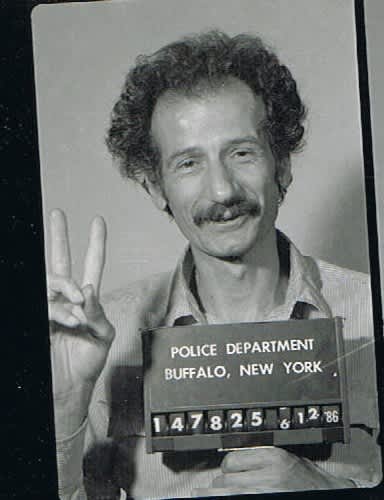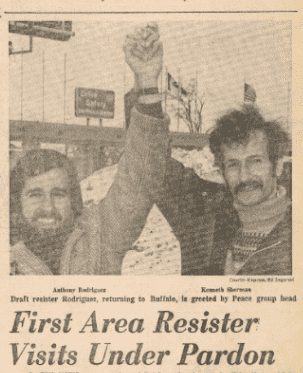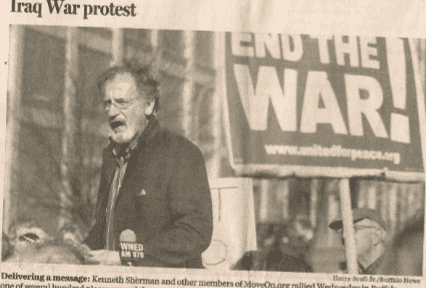by: Virginia Smith Feb 13 2018
Many members of Democrats Abroad Canada arrived in Canada during the Vietnam War era, from the late 1960s to the early 1970s. A number of them, including Ken Sherman, were involved in efforts to stop the conflict.
Ken Sherman is the chair of DA Canada’s Hamilton – Burlington chapter and a member of the Democratic National Committee. He has also served as the global chair of Democrats Abroad and the chair of Democrats Abroad Canada.
Ken first became involved in anti-war efforts as a member of Clergy Concerned About Vietnam. He was a founder of the Draft Counselling Centre in Buffalo, New York, and was jailed at least seven times for his resistance activities. He was landed in Canada in 1996 and became a dual citizen soon after.

Ken started spending time in Canada in the early 1970s when his wife, a French national, started living in Ontario. At that time, he helped many Americans to find a place in Canada. After President Jimmy Carter’s amnesty for draft resisters was enacted, Ken drove a friend back to the U.S. The border crossing was publicized on national television as the first return home of an American after the amnesty.

DA Canada recently asked Ken to share some of his reflections about that tumultuous era.
● Tell us about a couple of the ways the Vietnam War changed your life.
The war made me a political activist. I and others began using the electoral system to raise issues to end the Vietnam War and redirect its resources to the urban infrastructure. I ran as a peace candidate for Buffalo City Council in 1969. I worked to support peace candidates in the 1968, 1972, and 1976 Federal elections. In the end, it was Congress that ended the war by not funding it.
The war also made me aware of the role of globalization. My wife to be was a French citizen who moved to Canada. She was looking for progressive politics that matched her views for world peace. We worked out an interpersonal relationship across borders and cultures to raise three children. I think about 90% of the Americans who came to Canada did so for similar reasons of love.
The movement of so many Americans at that time into Canada also changed the Canadian cultural environment and Canadian society.
● How did the war affect your commitment to your responsibilities as an American?
The global context of the Vietnam War woke me up to the situation in the Americas. I learned of the realities of U.S. imperialism in Central America / Nicaragua, for instance, and later in Afghanistan. I did coffee picking in Nicaragua in 1984 as part of a peace delegation. I realized then that the U.S. economic engine must have a war to feed its military machine.
Before he left office, President Carter warned that the battles of the future would be focused on the petroleum economy. I organized an energy coop in 1976 as energy conservation was becoming the new political framework. I supervised a staff of ten insulating inner city homes.
At the time of the first Iraq war in 1990, there was a movement to boycott the use of gasoline. I joined a peace demonstration to oppose the invasion. After, I turned to riding my bicycle where I could. My bicycle slipped on ice when returning from church one Sunday, and I broke my hip. I had to have three pins put into my hip. They remind me of the futility of that war.
● What has been the ongoing impact of the Vietnam War on U.S. political life?
The war taught me the key role that grassroots political organizing has on social change. Those who have come through the anti-war experience make up much of the progressive base of the Democratic Party today. They form a bloc that has been mobilized by the progressive wing of the party in response to the wars in Afghanistan and Iraq.
There is now a permanent anti-war movement. The church-based and other political groups that came together in a movement continue to be funded and have support.
This movement is much more diverse now though. Such was noticeable recently in the assembly at the Washington Women’s March the day after the inauguration of President Trump. Everyone’s cause was on display at this march with great joy. The march was so full of love and respect. The movement to end the Vietnam War was composed largely of liberals and the college left.
I was so proud to be a Canadian and an American at the Women’s March.
● Are there similarities between the activism of the 1960s and today’s activism?
It is still true that social change comes through grassroots and political organizing. There is no social change without grassroots organizing.
● Is U.S. society as polarized now as it was then?
Yes, the country is as polarized now as it was in the 1960s. The war was wound down when the most people realized that there was no redemption in continued fighting and no victory to be won. Right now, Middle America is propping up Donald Trump. Political activism is again needed to mobilize the grassroots citizenry.
● What action is needed right now?
The progressive sector of the Democratic Party needs to focus on getting out the vote for the 2018 mid-term elections. We need to turn back the Republican Party from any more gains accomplished by gerrymandering districts in advance of the next U.S. census.



